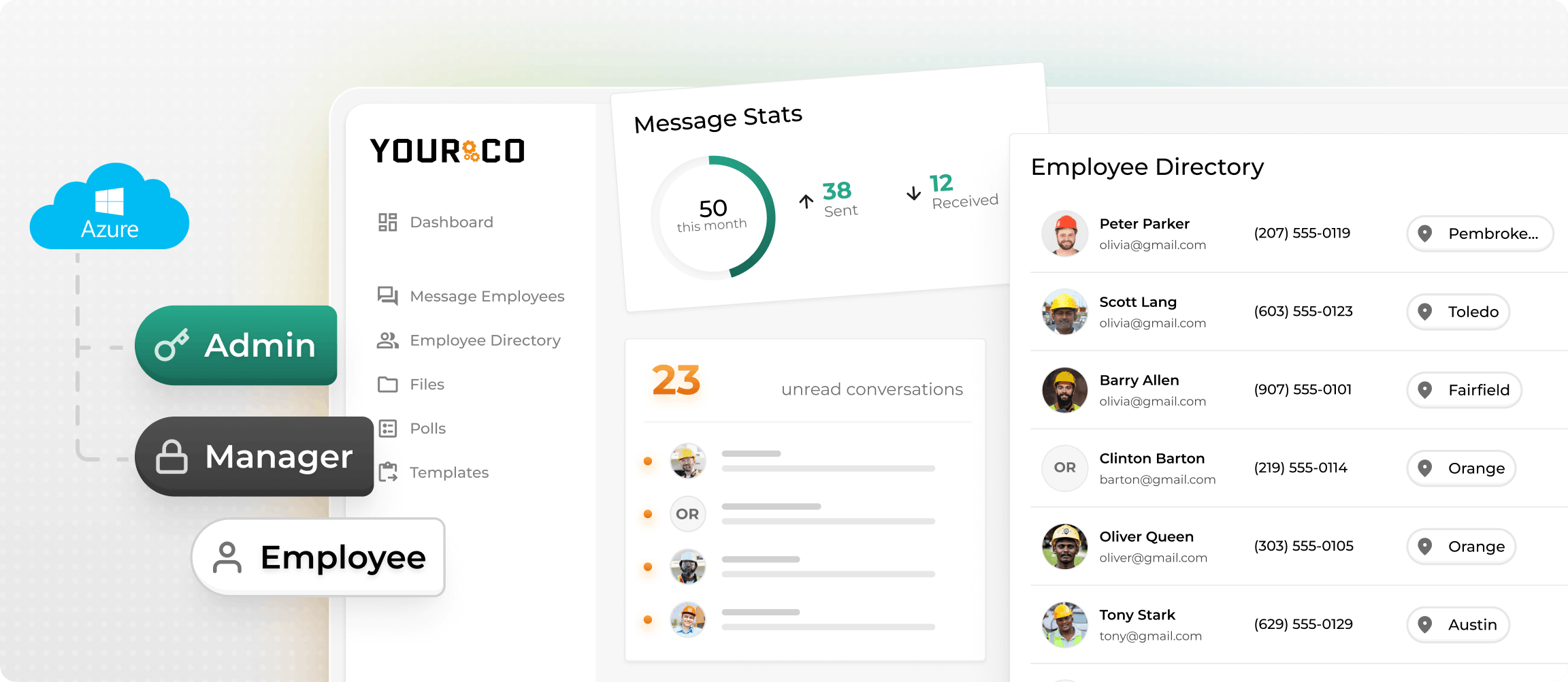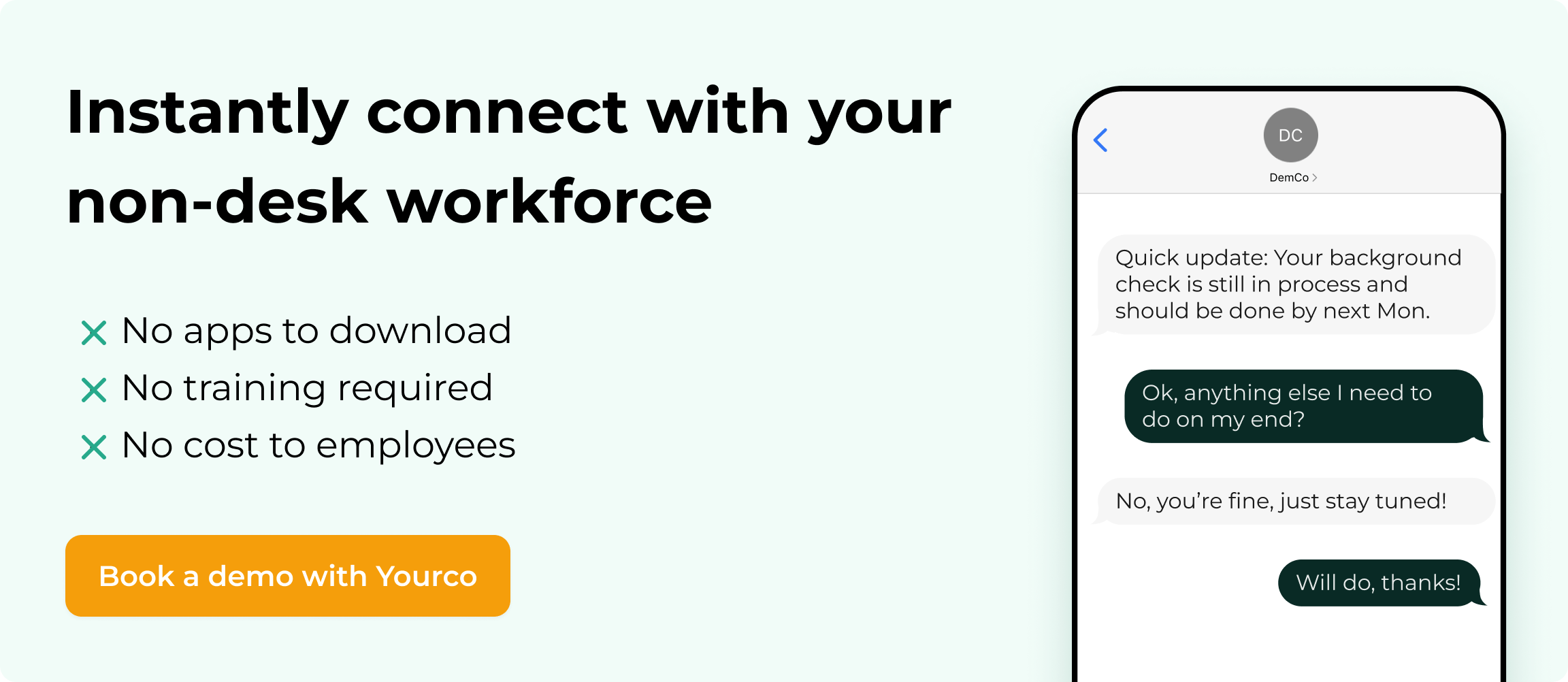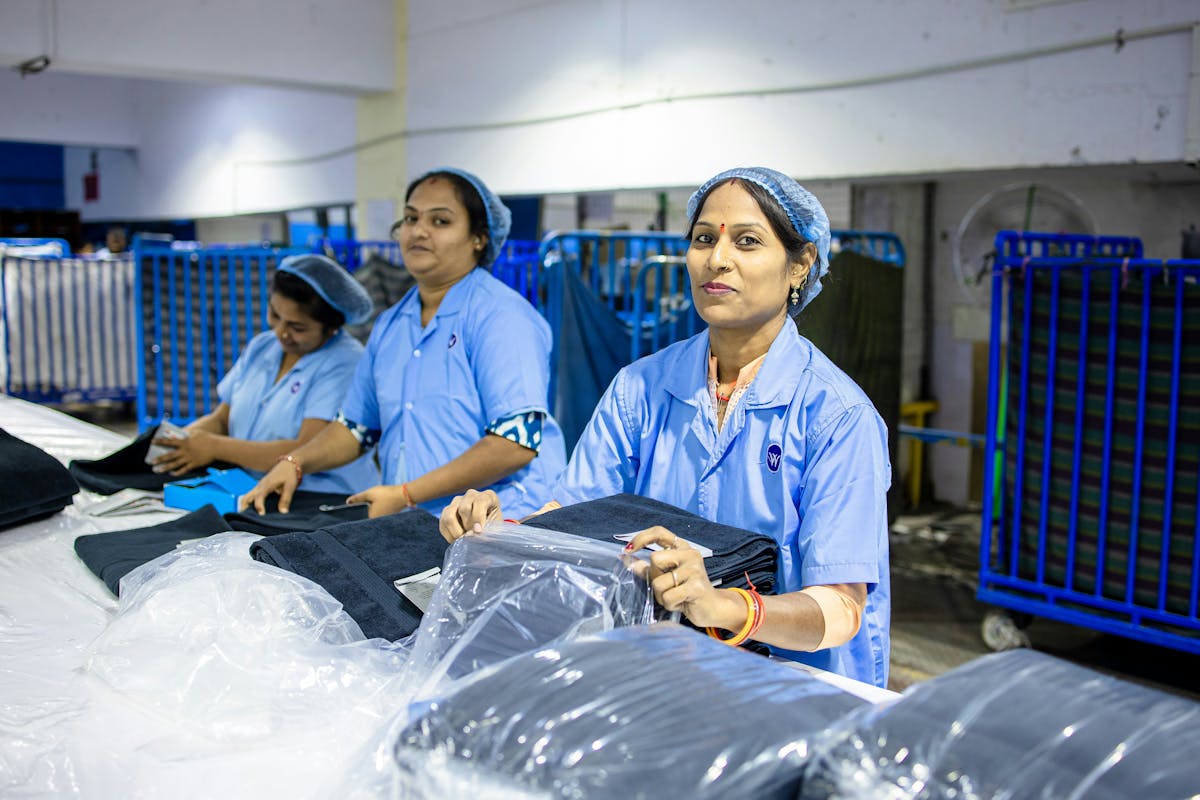Better Ways Food and Beverage (F&B) Teams Can Talk on the Job


Great service depends on great communication. But in the world of food and beverage, keeping every team member on the same page can feel impossible. Kitchen noise, floor rushes, and constant bar handoffs make it easy for critical updates to get lost. A missed prep note, a last-minute schedule change, or a forgotten safety reminder can throw the whole operation off balance.
Most communication tools just weren't built for the realities of F&B work. Team members move fast, don't sit at desks, and often speak different languages. Whether you're running a hotel restaurant, managing catering operations, or coordinating event dining, SMS solves this problem. It cuts through the noise, reaches every phone instantly, and keeps messages short, clear, and accessible — no apps, logins, or WiFi needed.
This guide explains why traditional channels break down on the floor, what instant communication should look like in a hot, noisy kitchen, and how simple text messages can keep cooks, servers, and bartenders moving in sync across restaurants, hotels, and events.
Common Communication Breakdowns in F&B Operations
F&B communication breaks down fast across all hospitality settings. Shift changes lose updates, whiteboards miss half your team, and service chaos swallows critical information, resulting in missed prep steps, short-staffed stations, and dishes that never reach waiting tables or event guests.
These breakdowns follow predictable patterns:
- Temperature log failures – The morning prep cook forgot to document freezer temps, and now you're scrambling before the health inspector arrives
- Event guest count changes – Sales just increased tonight's banquet from 150 to 200 guests, but the kitchen is still prepping for the original number
- Allergen cross-contamination risks – A server doesn't know the fryer oil changed, and table 12's severe peanut allergy becomes a liability nightmare
- Last-minute vendor substitutions – Your fish supplier swapped halibut for cod, but half the kitchen is still prepping the wrong special
- Hotel room service coordination gaps – Front desk confirmed a gluten-free request for the VIP suite, but the message never reached the kitchen
- Certification deadline chaos – Three servers' food handler permits expire next week, but nobody tracked the renewals
- Equipment breakdown confusion – The ice machine died overnight, but the morning bartender doesn't know until customers start complaining about warm drinks
- Catering setup miscommunication – The event coordinator changed the cocktail hour location, but the bar team is still setting up in the wrong ballroom
- Verbal handoffs during busy shifts – You mention allergen notes or 86'd items to the next cook, but they can't hear you over the hood fans
- Paper-based systems that fail consistently – Schedule changes on bulletin boards don't reach servers who clock in through the back door
- Incident details lost in verbal reports – A spill in the walk-in cooler or minor cut in prep gets forgotten by shift end
Without clear, written documentation of procedures and acknowledgments, managers can't track whether critical safety protocols are actually being followed. The disconnect becomes especially costly during busy periods when quick policy updates or safety reminders need to reach every team member immediately, regardless of their location in the facility or their primary language.
Why Traditional Workplace Tools Don't Work on the Floor
The usual workplace communication channels, such as email, company portals, and desktop messaging, work fine in an office, but they create problems once you step into a noisy kitchen or bustling event space. When your line cooks can't hear you over the vent hood, they won't dig through threaded messages on a computer either.
Email performs particularly poorly with F&B teams. Most emails sit unread for hours or days, and most cooks don't even have a company inbox. Messages that require immediate attention can't wait for someone's next break to check their computer. When an event planner needs to communicate a dietary restriction update to the catering team 30 minutes before service, email simply doesn't work.
Many frontline workers rely on prepaid data plans or basic phones without internet access. A notification that sits in the cloud until the next WiFi break isn't immediate messaging. Any lost connection means missed updates, and a single missed update means the wrong entrée hits the pass or an event guest with allergies receives the wrong meal.
Personal messaging creates its own set of problems. Work and social threads blur together, phone numbers get exposed across your entire team, and there's zero audit trail for compliance issues or disputes. Many non-desk employees report that current communication tools make them feel overlooked rather than supported by their employers.
With high hospitality turnover, expecting new hires to master yet another digital system simply isn't realistic. The constant training (and re-training) becomes a drain on management time.
What F&B Communication Should Look Like

Your crew needs messages that get through immediately and reach the right people. In a busy kitchen, packed dining room, or active event space, instant communication must be accessible so no task falls through the cracks.
Line cooks and bartenders rarely check email mid-shift, and many servers don't have company logins. Event staff moving between ballrooms may not have access to office systems. A channel that works on any phone without downloads, usernames, or WiFi needed removes those barriers and keeps everyone connected. When updates arrive directly on the device staff already carry, you avoid the information gaps that plague non-desk workers.
Daily temperature monitoring becomes seamless when your opening team can confirm freezer, cooler, and hot-hold temperatures via text, creating automatic logs for health department compliance.
Allergen management stays consistent when ingredient changes trigger immediate alerts to all stations. When your supplier switches to a different bread containing sesame, every server and cook knows before the first order goes out.
Event coordination improves when last-minute changes flow instantly from sales teams to catering staff. Guest count increases, dietary restrictions, and setup modifications reach the kitchen immediately rather than getting lost in email chains.
Inventory coordination prevents waste when your prep team can instantly share what's running low. Instead of discovering you're out of salmon during the dinner rush, morning prep texts the count so management can 86 items or arrange emergency deliveries.
A diverse workforce defines F&B operations, and language barriers can turn minor miscommunications into major safety issues. Automatic translation ensures safety alerts and prep changes are understood equally by every team member, preventing costly mistakes and creating a more inclusive work environment.
Relevance matters as much as reach. Instead of overwhelming everyone with every message, organize communication by role (e.g., front of house, back of house, bar, events) so the pastry chef isn't scrolling through bar inventory notes and event coordinators only see updates relevant to their functions. Targeted messages keep noise down and productivity up, while ensuring compliance updates reach the right departments.
Shift changes happen quickly, so reliable message history becomes essential. Being able to scroll back and confirm that table 42 requested a nut-free dessert or that the wedding party has a shellfish allergy beats hunting for a smudged whiteboard note. It also gives incoming staff a clear picture of earlier issues, improving consistency across service periods. Written records help managers track whether safety protocols are being followed and provide documentation for health inspections.
Integrate daily operations into the same communication stream. Quick scheduling tweaks, hygiene reminders, and event setup changes should travel alongside updates on specials. When managers can send reminders and collect quick acknowledgments, it's easier to ensure everyone received important information. With staffing shortages squeezing margins, streamlined communication helps teams work more efficiently while maintaining standards.
Why SMS Stands Out for Non-Desk F&B Teams
Fast-moving kitchens, dining rooms, and event spaces need messages that land right away. SMS does that job better than any other channel, requiring no downloads, logins, or training.
Everyone on your roster already has a phone that can receive a text, even if it's a flip phone with no data plan. Because SMS rides on the cellular network, it still works when the WiFi drops in a stainless-steel prep room, basement storage area, or outdoor event space. That instant reach matters when you're juggling last-minute call-outs or a menu change during the dinner rush.
Texts get seen quickly and consistently. Unlike email, which often sits unread for extended periods, text messages appear front and center on any phone screen. For frontline teams who struggle to stay connected with management, that immediate visibility makes a real difference in day-to-day operations. Because SMS stays outside social feeds, it keeps a healthy line between work and personal life.
Consider the split-second decisions that define service quality:
- VIP reservation shows up early – Front of house needs the kitchen to prioritize table 6's order immediately
- Event guest count increases – Sales just confirmed 50 additional attendees, and catering needs to adjust portions now
- Grill temperature spikes – Line cooks need to switch stations before proteins overcook
- Wedding cake delivery delayed – Event team needs to adjust timeline and notify the wedding planner immediately
- Alcohol delivery arrives – Bar staff must verify the order and update inventory before happy hour starts
- Fire suppression system test – All stations need to shut down simultaneously for safety compliance
- Hotel guest reports food allergy – Room service team needs immediate kitchen coordination for safe meal prep
- Dishwasher calls out sick at 3 p.m. – You need to reach backup staff immediately
- Supplier swaps in different fish – Your entire kitchen needs that update before service
- Banquet room flooded – Event coordinator must relocate 200-person dinner and coordinate with all F&B staff
- County inspectors announce surprise visit – Every team member should know the drill without delay
- Emergency evacuation needed – SMS becomes the lifeline when seconds count
In each case, one well-timed text keeps everyone aligned. You can send a shift reminder, push an updated prep list, or share a quick safety protocol without stepping off the line. Modern texting platforms add accountability without extra effort — delivery receipts show who got the message, scheduled sends respect off-hours rules, and automatic logs give you a clean audit trail if questions arise later.
Streamline Your Team Communication with Yourco
Running a kitchen, dining room, or event operation means you're constantly moving, and chasing down staff through multiple channels just doesn't work. Yourco sends one text that reaches every cook, server, bartender, and event coordinator instantly through plain SMS —no downloads, passwords, or WiFi headaches. Since it works on any phone, including basic flip phones, nobody gets left behind. You type your message and hit send, and within seconds it lands in everyone's pocket, so you can warn the line about menu changes or alert event staff about setup modifications before service begins.
Target the right people every time by sorting staff by role, location, or shift:
- Send prep lists to the back of house
- Share drink specs with bartenders
- Push allergy alerts to everyone on duty
- Update event coordinators on guest count changes
- Alert hotel room service about special dietary requests
Handle the daily operational challenges that make or break service:
- Temperature alerts – Automatic reminders for hourly temp checks with photo confirmation
- Allergen updates – Instant notifications when ingredients change or new allergens appear
- Event coordination – Real-time updates on guest counts, dietary restrictions, and setup changes
- Prep coordination – Updates on prep completion, shortages, and special orders
- Health inspection readiness – Quick protocol reminders and checklist confirmations
- Vendor communication – Direct updates on delivery times, substitutions, and quality issues
- Certification tracking – Automated reminders for expiring food handler permits and training deadlines
- Hotel guest services – Coordinate room service requests and special accommodations across departments
Scheduled messages handle recurring tasks automatically (e.g., opening duties at 7 a.m., health-code reminders at noon, event setup checks at 4 p.m., closing procedures at midnight), while respecting off-hours rules. Language barriers disappear with automatic translation into over 135 languages and dialects, and message tracking shows exactly who received each update and who needs a follow-up.
When incidents occur, staff can text photos and notes directly to your company number for timestamped reports that support insurance claims and safety investigations. All messages travel through encrypted networks with delivery logs that create audit trails for health inspectors and HR reviews.
Hotel chains and catering companies already use Yourco across multiple locations, proving the system scales from single operations to nationwide franchises without IT support. Don't let communication chaos slow down your service. See how Yourco keeps your kitchen, dining room, bar, and event teams moving in sync. Try it free today or book a demo — because when tickets are flying and events are in motion, every second counts.
Frequently Asked Questions
Can SMS work for employees who don't speak English?
Yes. Yourco automatically translates messages into over 135 languages and dialects based on each employee's preferred language setting. Safety alerts, schedule changes, and daily instructions reach every team member in the language they understand best, reducing miscommunication and improving compliance.
What happens if an employee doesn't have a smartphone?
SMS works on any phone that can receive text messages, including basic flip phones. Your team members don't need internet access, data plans, or smartphone features to stay connected. This ensures even your most budget-conscious employees can participate fully in team communication.
How do we track who received important safety or compliance messages?
Yourco automatically logs every message with delivery confirmation and timestamps. You can see exactly who received each communication and when, creating a clear audit trail for health inspectors, HR reviews, or compliance documentation. This eliminates the guesswork around whether critical information reached your entire team.
How quickly can we update teams about event changes or menu modifications?
Messages reach your entire team within seconds via SMS. Whether you need to 86 the salmon, communicate a guest count increase, or update allergen information, everyone from prep cooks to event coordinators gets the same information instantly, preventing costly mistakes during service.
How do we handle temperature logging and food safety alerts via SMS?
Staff can text temperature readings with photos directly to your Yourco number, creating timestamped records for health inspections. Automatic reminders ensure no logs get missed, and alerts go out immediately if any reading falls outside safe ranges.
Can we coordinate between hotel departments and F&B teams?
Yes. Yourco enables seamless coordination between front desk, sales, event planning, and F&B teams. When front desk receives a guest dietary restriction or sales updates an event guest count, that information flows instantly to the relevant kitchen and service staff.



